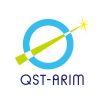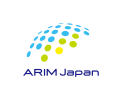What's New
- 2024.6.26
- JAEA&QST Joint Workshop on Application of Synchrotron Radiation Equipments (in Japanese) will be held on Aug. 29th, 2024.
- 2024.5.1
-
We are accepting Application Forms for 2024B Research Proposals by May 31st, 2024.→closed
- 2024.2.22
-
Trial provision of ARIM datasets has started. Please take a look at the following website (in Japanese).
トップページ | ARIMデータ提供システム公式ホームページ (mext.go.jp)
- 2024.2.22
- The first ARIM joint seminar on measurent technologies by two ARIM technology areas on advanced materials recycling technologies and materials using quantum and electronic control will be held online on March 11th, 2024.
- 2023.11.1
-
We are accepting Application Forms for 2024A Research Proposals by November 30th, 2023. →closed
- 2023.8.4
- JAEA&QST Joint Workshop on Application of Synchrotron Radiation Equipments will be held on Sept. 29th, 2023.
- 2023.5.1
-
We are accepting Application Forms for 2023B Research Proposals by May 31st, 2023. →closed
- 2023.1.24
-
Kyoto Univ., JAEA and QST Joint Seminar on Latest Analyses of Fine Structure and States will be held online on Feb. 21st, 2023.
Overview of the Advanced Research Infrastructure for Materials and Nanotechnology in QST
The National Institutes for Quantum Science and Technology (QST), established in April 2016, have two contract beamlines at SPring-8, and are developing advanced technologies for synchrotron use. QST was entrusted with the MEXT Advanced Research Infrastructure for Materials and Nanotechnology in Japan (ARIM) in 2021. Since then QST has participated as a spoke. QST promotes the use of apparatuses for structure and electronic states analyses by researchers from universities, companies, and public research organizations. Specifically, comprehensive analyses of crystal structures, their local structures, electronic states, and surface crystal growth by scattering, diffraction, and absorption of synchrotron radiation are supported.
The ARIM project was started in 2021 by the Ministry of Education, Culture, Sports, Science and Technology (MEXT). The Nanotechnology Platform Japan project implemented from 2012 to 2021 promoted shared use of experimental equipment (sharing of cutting-edge apparatuses and research support). Sharing of data is positioned as a cornerstone of the ARIM project in addition to sharing of apparatuses.
The ARIM project, in which 25 universities and research organizations in Japan participate, is responsible for research in seven important technology regions. QST participates in the region of materials for innovative functions by quantum/electronic control. Each region consists of a hub and several spokes. While making use of the research support basis developed in the Nanotechnology Platform Japan project, the ARIM project adds data sharing and utilization as a new support field. These new initiatives will be implemented in the 10 years from FY2021.
Website of ARIM
Outline of QST-ARIM
Calls for Applications
- 2024.5.1
-
We are accepting Application Forms for 2024B Research Proposals by May 31st, 2024.→closed
Consultations are also available at any time, free of charge. Application Forms for 2025A Research Proposals will be accepted in November 2024.
- 2023.11.1
-
We are accepting Application Forms for 2024A Research Proposals by November 30th, 2023.→closed
Consultations are also available at any time, free of charge. Application Forms for 2024B Research Proposals will be accepted in May 2024.
- 2023.6.1
-
We are accepting Application Forms for 2023B Research Proposals by May 31st, 2023. →closed
Consultations are also available at any time, free of charge. Application Forms for 2024A Research Proposals will be accepted in November 2023.
Proposal Applications
- 2024.5.1
- You can use an SR experimental apparatus attributed to QST in BL11XU (QST), BL14B1 (QST), and BL22XU (JAEA). Please submit QST application form to QST. Details are shown in Procedures for QST-ARIM users. If you plan to use a QST apparatus in BL14B1 (QST) and BL22XU (JAEA), please confirm an attributable organization for the apparatus and submit QST application form to QST with no attention to beamline attribution.
Information
- 2024.5.1
- Trial Use Program is available in the ARIM project. Please feel free to contact us.
Events
- 2024.6.26
-
JAEA&QST Joint Workshop on Application of Synchrotron Radiation Equipments (in Japanese), MEXT Advanced Research Infrastructure for Materials and Nanotechnology in Japan will be held on Aug. 29th, 2024 at Houkoukan, SPring-8 in combination with online.
- 2024.2.22
- The first ARIM joint seminar on measurent technologies by two ARIM technology areas on advanced materials recycling technologies and materials using quantum and electronic control will be held online on March 11th, 2024.
- 2023.8.4
-
JAEA&QST Joint Workshop on Application of Synchrotron Radiation Equipments,
MEXT Advanced Research Infrastructure for Materials and Nanotechnology in Japan will be held on Sept. 29th, 2023 at Houkoukan, SPring-8 in combination with online.
- 2023.1.24
-
Kyoto Univ., JAEA and QST Joint Seminar on Latest Analyses of Fine Structure and States will be held online on Feb. 21st, 2023.
Topics
- 2022.4.8
- Renewed QST-ARIM website has been released.


